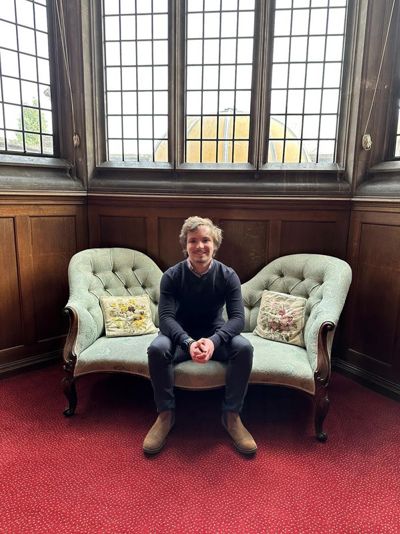“Little sparks of motivation” – Radley’s story
12/06/2023
When Radley first experienced psychosis, he was unable to do the things he enjoyed, like competing as a junior athlete, his hobbies or socialising with friends. However, little sparks of physical activity and meditation allowed him to regain the hope and happiness he had lost.
In 2017, I was a junior athlete competing at a stage of the Archery World Cup. I felt on top of the world. Less than two years later, I was sat in a doctor’s office, being told that I had psychosis and would likely spend most of my life being repeatedly sectioned.
My journey has been a long one and the first few years were the hardest. After being diagnosed, I was told that I was too unwell to receive counselling and was given increasingly higher dosages of medication to deal with the hallucinations and delusions I was experiencing. Everything was feeling more and more hopeless. I’d stopped doing almost all of my hobbies, stopped speaking to all of my friends and only left the house to buy snacks.
-
Recovery is about being able to do the things that I want to do, rather than being totally free of any symptoms.
The key to my recovery was two things: firstly, having simple achievable physical goals. Exercise is hard, very hard on antipsychotic medication! During the first two years after being diagnosed, I had lost almost all my fitness. I set a fairly achievable goal: that I wanted to be able to run for 30 minutes by the end of the year.
I started by going for 20-minute walks with my family every evening to get out the house and gradually build up my stamina. I gradually increased this amount of time over the year and started to go for very short jogs around my local streets. An important thing for me was to be able to see progress, so I’d suggest downloading a free running app onto a phone or smartwatch to see your progress visually.
At a time when I could feel little to no pleasure, gradually seeing my distance increase every few months gave me little sparks of motivation to continue to get better. Physical exercise gave me back a sense of control over my life. My symptoms started to feel like they weren’t controlling my life and the endorphins released from exercising gave me a sense of satisfaction.
-
Try and find things that make you happy, make simple achievable goals, and never give up.
Another thing which really helped me was meditation. I didn’t really feel like going to church or joining a spiritual group as I struggled with socialising, so I used a free meditation app and started with five minutes of meditation. It was very tough – on the first day I think I managed around 20 seconds. But I worked on it every day, even if I only did one minute. I found that meditating at the same time each day was very helpful in building a routine back into my life. Gradually I built up the time I could meditate for, and now I can meditate for an hour at a time.
Fast forward to 2023 and I have not recovered in the traditional sense. I still experience relapses sometimes and I still take medication. But I’m finally in a place where I’m happy with my life. I exercise regularly, managed to return to my studies and now have some friends that I can socialise with. I also completed a meditation instructor course so that I can help others. Recovery is different for everyone, and for me recovery is about being able to do the things that I want to do, rather than being totally free of any symptoms.
I hope this may help someone as I know psychosis can be a very dark time. Try and find things that make you happy, make simple achievable goals, and never give up on your recovery journey. I’ve learned so much about myself during my journey and I hope you will too.
Rethink Mental Illness are part of the We Are Undefeatable campaign which aims to get people living with long-term health conditions taking part in physical activity. Do you live with a long-term health condition? Find ways to get moving for you on the We Are Undefeatable website.

